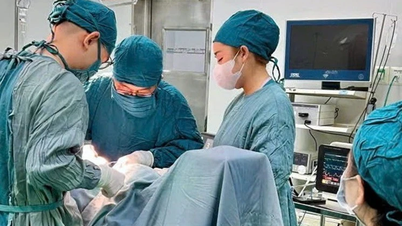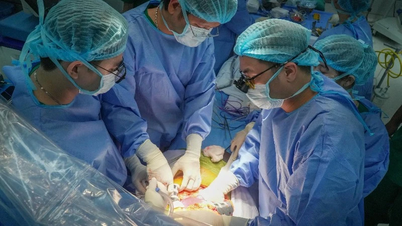I heard about gastric bypass surgery for obese people. I wonder if this method is effective and safe? Mai Anh (Tan Phu district, Ho Chi Minh City)
Reply:
Obesity is a chronic, progressive disease that tends to increase. Obesity is characterized by the accumulation of fat in the body, expressed through the body mass index (BMI). BMI is the correlation between weight and height of the body, calculated by the formula: weight (kg) divided by height squared (m). People with normal weight have a BMI between 18.5 and 24.9, overweight if BMI is from 25 to 30 and obese if BMI is greater than 30.
Being overweight or obese not only causes low self-esteem about appearance and body shape, but also carries many dangerous diseases such as: cardiovascular disease, stroke, high blood pressure, high cholesterol, sleep apnea, type 2 diabetes, bone and joint problems, metabolic syndrome. Therefore, in addition to the purpose of losing weight and improving body shape, weight loss surgery also helps prevent and improve health problems related to weight.
Weight loss usually begins with changing your diet and doing exercises or can be combined with medication. Weight loss surgery is the last method recommended by doctors when obese people have a BMI of 40 or higher or a BMI of 35-39.9 and have applied the above measures but have not been effective or have serious health problems such as high blood pressure, diabetes, apnea, high cholesterol...

Weight loss surgery is one of the methods of treating obesity. Photo: Freepik
Among the current weight loss procedures, endoscopic balloon placement, gastric band surgery, gastric sleeve surgery, gastric bypass surgery bring about obvious and safe weight loss results. These surgeries have the effect of reducing the volume of the stomach cavity, helping patients feel full faster and less hungry, reducing the ability to absorb nutrients.
Among them, gastric sleeve surgery is highly effective. This method removes about 70% of the stomach on the greater curvature side, forming a new stomach with a smaller size, reducing the secretion of ghrelin hormone that creates hunger and cravings. Thanks to that, the patient loses weight steadily after surgery. This is the most optimal weight loss surgery method when reducing 30% of excess weight after 3 months, 50% after 6 months and 70% after one year.
Gastric sleeve surgery is considered to be highly safe, with a survival rate of about 99.9%. About 10% of patients who undergo surgery experience complications, but most of them are mild and not life-threatening. In the long term, the harmful effects of obesity are much more dangerous than the risks of weight loss surgery. For example, obese people have an 85% higher risk of death within 5 years than patients who have had weight loss surgery.

Doctor Minh Hung examines a patient. Photo: Tam Anh General Hospital
When deciding to have surgery, the patient is thoroughly advised by the doctor between the benefits, costs and possible risks. Patients need to understand that weight loss surgery is only part of obesity treatment. The basic principle to lose weight and maintain a reasonable weight is to combine it with diet, exercise and a healthy lifestyle. Therefore, patients need to strictly follow the changes in diet and lifestyle after surgery to achieve effectiveness as well as avoid gaining weight again.
Dr. Do Minh Hung
Director of Endoscopy and Endoscopic Surgery Center, Tam Anh General Hospital, Ho Chi Minh City
At 8:00 p.m., Thursday, July 6, Tam Anh General Hospital System organized an online consultation program "Overweight and obesity - Safe weight loss and surgery" broadcast on the VnExpress fanpage. The program has the participation of leading doctors in the field of digestion, nutrition, and endocrinology at Tam Anh General Hospital, Ho Chi Minh City, including: Dr. Do Minh Hung (Director of the Center for Endoscopy and Endoscopic Surgery of the Digestive System), Dr. Lam Van Hoang (Professional consultant, doctor of the Department of Endocrinology - Diabetes), Dr. Dao Thi Yen Thuy (Head of the Department of Nutrition and Dietetics). Readers can send questions here to be answered by doctors. |
Source link


![[Photo] Solemn funeral of former Vice Chairman of the Council of Ministers Tran Phuong](https://vphoto.vietnam.vn/thumb/1200x675/vietnam/resource/IMAGE/2025/10/24/1761295093441_tang-le-tran-phuong-1998-4576-jpg.webp)
![[Photo] Prime Minister Pham Minh Chinh and South African President Matamela Cyril Ramaphosa attend the business forum](https://vphoto.vietnam.vn/thumb/1200x675/vietnam/resource/IMAGE/2025/10/24/1761302295638_dsc-0409-jpg.webp)
![[Photo] Prime Minister Pham Minh Chinh chairs conference on breakthrough solutions for social housing development](https://vphoto.vietnam.vn/thumb/1200x675/vietnam/resource/IMAGE/2025/10/24/1761294193033_dsc-0146-7834-jpg.webp)
![[Photo] President Luong Cuong chaired the welcoming ceremony and held talks with United Nations Secretary-General Antonio Guterres](https://vphoto.vietnam.vn/thumb/1200x675/vietnam/resource/IMAGE/2025/10/24/1761304699186_ndo_br_1-jpg.webp)








































































































Comment (0)